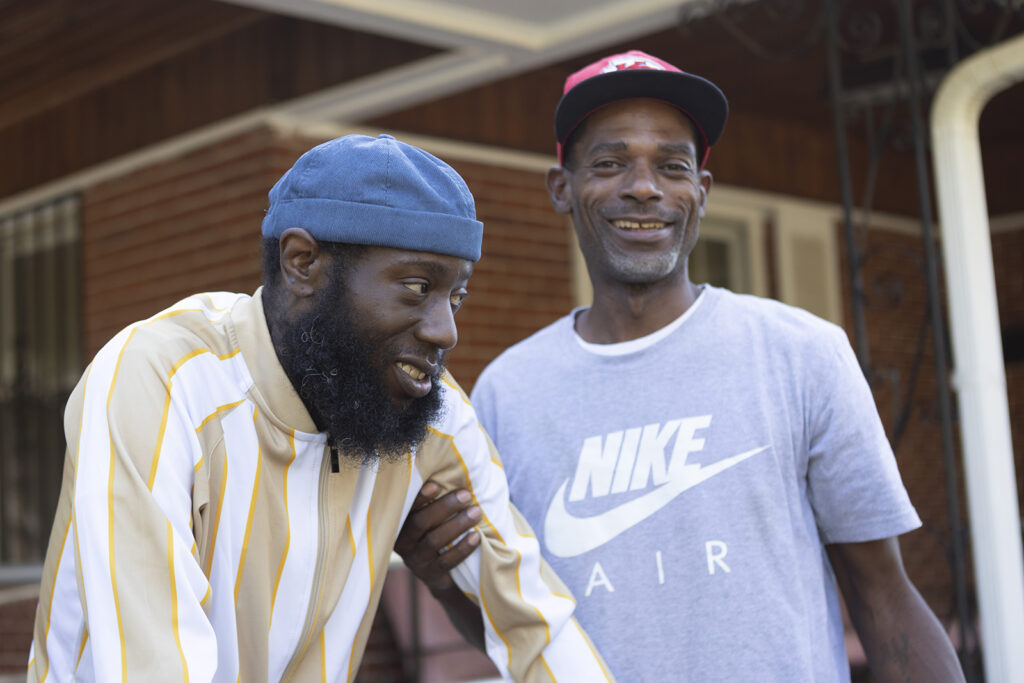By Jordyn Davis | For The Birmingham Times
Clifford Ellis never expected his life to take the path of caregiving, but that changed when close friend Michael Alford called. Alford had his leg amputated in February 2025, following complications with diabetes, and the two live in a house in Birmingham’s West End Community.
Ellis is there to wake Alford, distribute his medicine, help him dress, prepare meals, and clean the house.
“Taking care of others is how I am able to take care of myself,” Ellis said. “I continue to try to show my love for [Alford] by taking care of him like I would my own brother. When he eats, I eat. I stay here with him all the time, and I’m always on the clock.”
Alford remembers meeting Ellis through his sister at a party he had last December. Instinctively, he knew Ellis would be someone he could count on, so Alford called.
Ellis recalled, “When I met [Alford] the first time, it was like our spirits connected. Something made me gravitate toward him. He was so happy, full of life, and energetic. He was the life of the party. I was like, ‘Who is this?’ It was just up from there. You would think we were friends for life. It hasn’t been a year.”
When Alford requested help, Ellis answered.
“I’m trying to show my love [to Alford] and be there for him,” Ellis said. “When you see a person down, you should always come to their aid, whatever the circumstance may be. You never know what God has in store for you when you help someone else. If I ever found myself in need, I would want someone to do the same thing for me.”
November is National Family Caregivers Month, a time to recognize and honor those who support loved ones with chronic illnesses, disabilities, or other needs. A report released in July 2025 by AARP and the National Alliance for Caregiving shows that nearly one in four adults—63 million Americans—provided care for an adult or child with a complex medical condition or disability in the past year. That is an increase of 20 million over the last 10 years, and this number is expected to continue to increase as the population ages.
African American family caregivers have the highest prevalence of caregiving in the U.S. and are often in high-intensity roles that require regular interaction with health care providers. They also tend to be younger caregivers and more often have children at home while caregiving.
Both Ellis and Alford, who is also a veteran, believe they wouldn’t be able to continue carrying out their day-to-day schedules without the grace and help of God.
“As much as I commend [Ellis], the number one person that gets all the recognition is God,” said Alford. “It’s amazing how my life has changed within the course of a year. There have been times when I’ve not been in a good place mentally, and I’ve lashed out and said some harsh things. God has been there consistently through it all, and I have to realize this was all a lesson and a test of my faith.”
In addition to having his leg amputated, Alford is on dialysis, a process through which extra fluid and waste are removed from the body when the kidneys are not functioning, and he must visit the VA hospital three times a week for treatments.
“Not only am I dealing with the loss of a limb, but I’m sitting in a chair three times a week to have my blood drained and cleaned. It’s rough, but I’m making it. It’s not for the weak,” said Alford, adding that he thanks God for “an inner peace of mind and the ability to stay rooted and focused because it’s not easy at all.”
It’s not easy being a caregiver, either, but the emphasis is on caring, Ellis said.
“You’re caring for this person. You’re giving this person hope. Keep in mind, we all may come to a time when we need somebody. Being there to help somebody is a good feeling. By helping them, you motivate them.”
Ellis added, “To be a caregiver, you have to have love. With that love, it will motivate you to help a person, [to help] strengthen that person. So, when you take it upon yourself to care for somebody, you’re doing it out of love.”
Are you a full-time, unpaid, family caregiver for a loved one of any age with a chronic illness or disability who requires around-the-clock care? If so, you are invited to apply for the Alabama Respite Reimbursement Program.
Alabama Cares, a program of the United Way Area Agency on Aging, is here to help caregivers with the issues that may arise from their unique responsibilities, demands, and stress of caregiving.
Visit [insert link here] for more information.
https://www.birminghamtimes.com/2025/11/clifford-ellis-taking-care-of-himself-by-taking-care-of-a-friend/

